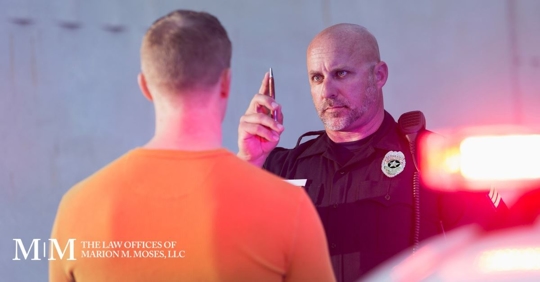What are the Types of Field Sobriety Tests in South Carolina?
Police officers typically rely on two testing methods to evaluate a driver’s sobriety: breath tests and field sobriety tests. However, field sobriety tests are highly criticized for not being an accurate method of determining a driver’s level of impairment. Let’s go over what to know about field sobriety tests so you can make an informed decision about whether or not to participate in them if asked.
There are three main standardized field sobriety tests.
One-Leg Stand Test
During this test, the driver will be instructed to stand on one leg while holding their other foot up, parallel to the ground, about six inches high. They will then count out loud until the officer instructs them to stop.
While the driver completes the test, the officer will be looking for any physical signs of impairment. During this test specifically, the officer will look for:
- Swaying
- Hopping
- Using arms to maintain balance
- If the driver doesn’t follow the directions
Even just two of these behaviors can lead the driver to fail the test.
Walk and Turn Test
For the walk and turn test, the driver will be told to take nine steps, heel-to-toe in a straight line. They will then have to pivot and do the same walk back to the officer.
During this test, the officer will look for the signs of impairment listed above, as well as:
- Inability to walk in a straight line
- Taking the incorrect number of steps
- Inability to walk heel-to-toe
- Failure to pivot
Horizontal Gaze Nystagmus
The two tests explained above rely on balance and movement; the horizontal gaze nystagmus (HGN) test focuses on the eyes and head motion.
During an HGN test, the officer will hold an object in front of the driver’s face, usually a pen. They will instruct the driver to follow the object with their eyes without moving their head. They will then slowly move the pen side to side.
During this examination, the officer will check to see if:
- The driver’s eyes are jittery
- Dilated pupils
- The driver cannot follow the object smoothly with their eyes
- The driver cannot follow the object without moving their head
As we will discuss, however, numerous non-alcohol-related factors could influence your performance on a field sobriety test.
Why Sober Drivers Could Fail Field Sobriety Tests?
Unlike a breath test, there is no clear score after a field sobriety test. Instead, the results of the test are based purely on officer discretion. This comes into question when you consider the multiple factors that can influence field sobriety test performance, even for sober drivers.
Anxiety
When you’re pulled over for suspected DUI, it is a scary experience. You know that officers are looking for a reason to arrest you, and this is incredibly anxiety-inducing. However, many physical symptoms of anxiety are similar to symptoms of alcohol impairment. Inability to balance during a field sobriety test may be mistaken as intoxication when instead, your legs are feeling numb and weak from anxiety.
Underlying Medical Conditions
Medical conditions can affect your ability to pass a field sobriety test.
Conditions that have been found to impact your mobility during a field sobriety test include:
- Vertigo
- Epilepsy
- Any recent surgeries
- Head injuries
- Muscle strains or sprains
If you suffer from one of these conditions and have failed a field sobriety test, you can challenge the results.
Road Conditions
The area where you are stopped could end up influencing how well you perform during a field sobriety test.
If you are pulled over on a busy street, there may be a lot of outside noise from cars whirring by, honking, or other sounds. This may affect your hearing, and you may misunderstand the officer’s instructions. Then, if you fail to follow the instructions during the test, the officer may believe it’s because you are intoxicated rather than it being due to misunderstanding.
You may also struggle to maintain balance due to:
- Wet roads
- Rocky or uneven pavement
- Poor weather conditions
What is South Carolina’s Implied Consent Law?
Implied consent laws state that drivers automatically consent to take breath or blood tests when asked by police. Field sobriety tests are not covered under these laws. This means that participating in field sobriety tests is 100% voluntary. We recommend that you always refuse to participate because even sober drivers fail these tests regularly.
South Carolina DUI Defense
If you have been charged with DUI after a failed field sobriety test, contact us at The Law Offices of Marion M. Moses, LLC. We can help you challenge the validity of the results.

